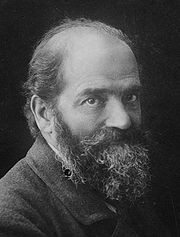
Ernst Schweninger
Encyclopedia

Germans
The Germans are a Germanic ethnic group native to Central Europe. The English term Germans has referred to the German-speaking population of the Holy Roman Empire since the Late Middle Ages....
physician
Physician
A physician is a health care provider who practices the profession of medicine, which is concerned with promoting, maintaining or restoring human health through the study, diagnosis, and treatment of disease, injury and other physical and mental impairments...
who developed the Schweninger method, a reduction of obesity by the restriction of fluids in the diet.
Biography
He was born in 1850 in FreystadtFreystadt
Freystadt is a town in the district of Neumarkt in Bavaria, Germany. It is situated near the Rhine-Main-Danube Canal, 14 km southwest of Neumarkt in der Oberpfalz, and 33 km southeast of Nuremberg....
, Upper Palatinate
Upper Palatinate
The Upper Palatinate is one of the seven administrative regions of Bavaria, Germany, located in the east of Bavaria.- History :The region took its name first in the early 16th century, because it was by the Treaty of Pavia one of the main portions of the territory of the Wittelsbach Elector...
. He studied medicine at the Ludwig Maximilians University of Munich
Ludwig Maximilians University of Munich
The Ludwig Maximilian University of Munich , commonly known as the University of Munich or LMU, is a university in Munich, Germany...
where he received his M.D. in 1870. His appointment to a chair
Chair (official)
The chairman is the highest officer of an organized group such as a board, committee, or deliberative assembly. The person holding the office is typically elected or appointed by the members of the group. The chairman presides over meetings of the assembled group and conducts its business in an...
at Berlin in 1884 against the wishes of the medical faculty
Faculty (university)
A faculty is a division within a university comprising one subject area, or a number of related subject areas...
was largely due to his successful treatment of Otto von Bismarck
Otto von Bismarck
Otto Eduard Leopold, Prince of Bismarck, Duke of Lauenburg , simply known as Otto von Bismarck, was a Prussian-German statesman whose actions unified Germany, made it a major player in world affairs, and created a balance of power that kept Europe at peace after 1871.As Minister President of...
for obesity
Obesity
Obesity is a medical condition in which excess body fat has accumulated to the extent that it may have an adverse effect on health, leading to reduced life expectancy and/or increased health problems...
. His method was a modification of the method developed by William Banting
William Banting
William Banting , was a formerly obese English undertaker who was the first to popularise a weight loss diet based on limiting intake of refined and easily digestible carbohydrates. He undertook his dietary changes at the suggestion of Dr...
. He pubvlished Dem Andenken Bismarcks in 1899. He retired to private life in Munich in 1905. He died in 1924.
See also
- Georg Richard LewinGeorg Richard Lewin-Biography:He was born in Sondershausen on April 25, 1820. He died in Berlin on November 1, 1896. He was educated at the universities of Halle and Berlin, graduating as doctor of medicine in 1845. After a postgraduate course at the universities of Vienna, Würzburg, and Paris he settled in Berlin,...

